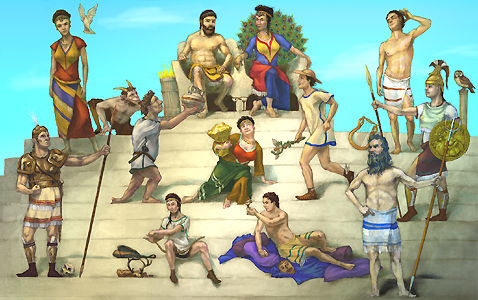
We see the evidence of ancient Greece around us every day — in the constellations we identify in the heavens or the Olympic games held every four years; in the stories we tell and in the movies we see; in the architecture of our houses, churches, and public buildings and in our democratic system of government."
—From the EDSITEment-reviewed Odyssey Online
Although myths convey exciting stories about gods and heroes, they are not equivalent to "stories" either in the modern sense of a deliberate fiction or the traditional sense of a folk tale or tall story. Rather, myths are traditional narratives that are passed down through various textual and visual sources and convey commonly held beliefs in a particular society about natural phenomena, historical events, and proper behavior. The myths are important to study not just for literary context but to understand how a society used literature as a means of establishing and defining their culture. Myths have serious themes and significant historical context. We read and study myths to understand the important distinctions between "stories" we read about cultures and culture itself.
Learning Objectives
After completing the lessons in this unit, students will be able to:
Describe the basic plots of three Greek myths.
Discuss three types of themes in Greek myths: stories about heroes, stories about "how it came to be," and stories about the consequences of unwise behavior.
Cite examples of contemporary use of terms from Greek mythology.
Analyze artistic and literary works based on or inspired by Greek myths.
Guiding Question:
What meanings did myths about gods, goddesses, and heroes have for the ancient Greeks? What meanings do the Greek myths have for us today?
|
|
|
|
| My Quia activities and quizzes |
|
https://www.quia.com/jg/1826250.html |
|
https://www.quia.com/jq/223930.html |
|
|
|
|
| Last updated 2010/07/12 00:23:27 EDT | Hits 346 |
|
|